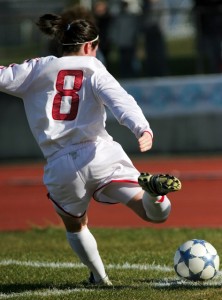 The Women’s World Cup is underway in Canada and soccer fans have been tuning in to watch some of the most elite female soccer players in the world compete for the title of world champion. But while most of the attention is on the competition itself, it’s also an opportune time to talk about one of the risks of the sport, concussions, according to Dr. Samuel Browd, a pediatric neurosurgeon and medical director of Seattle Children’s Sports Concussion Program.
The Women’s World Cup is underway in Canada and soccer fans have been tuning in to watch some of the most elite female soccer players in the world compete for the title of world champion. But while most of the attention is on the competition itself, it’s also an opportune time to talk about one of the risks of the sport, concussions, according to Dr. Samuel Browd, a pediatric neurosurgeon and medical director of Seattle Children’s Sports Concussion Program.
“Soccer is commonly called out as an example of a sport that has a high incidence of female concussion,” Browd said. “And this is for a couple different reasons. One is pure numbers. Many women play soccer causing the sport to have a higher concussion rate. Women commonly get a concussion from heading the ball or from falling and hitting their head on the ground. But another reason is simply due to the way the sport is played: aggressively.”
Concussions are caused by a bump or blow to the head or body, and pose a risk to athletes both young and old. A concussion is a mild traumatic brain injury, according to Browd, in which the brain moves back and forth quickly inside the skull.
Research shows that females have a higher rate of concussion compared to males when playing soccer, almost 2.1 times the risk. And with an estimated 3.8 million sports and recreation event-related concussions being reported each year by the Centers for Disease Control and Prevention, they are on the rise. Unfortunately, almost half of these injuries go undiagnosed.
“We know that women often have a higher incidence rate for concussion than men in the same sport, but we don’t know why,” said Browd.
So while the U.S. women’s team continues to take the pitch in the World Cup, sports medicine experts at Seattle Children’s would like to deliver a different kind of pitch to parents and children, one that may help young girls training to be the next Christie Rampone, captain of the U.S. women’s national team, stay in the game and off the sideline with a concussion.
“Parents and coaches should know their athletes,” said Browd. “And know their baseline. During a game, if a sudden onset of headache, amnesia, or loss of consciousness occurs, immediately take that player out and have them evaluated. Sometimes we’re unclear whether a player has sustained a concussion. When in doubt, sit them out. Players may experience symptoms in a delayed fashion, and state law mandates a healthcare professional clear the player before returning to play.”
If a child suffers a concussion or is believed to have suffered a concussion during play, it’s important to have them evaluated by a medical professional before returning to practice or a game. Symptoms of concussion can include headache, nausea, vomiting, confusion, dizziness, and possibly blurry vision, said Browd.
Although it’s unknown why women and girls are more susceptible to concussion, treatment for concussion for both girls and boys are the same. The best treatment is rest from physical activity and mental rest may be prescribed. Unfortunately, recovery time for girls, according to research, on average takes longer. But rest is important and neccessary to recovery. Returning to play too early could be dangerous and very rarely fatal. It’s important to be seen by a licensed healthcare provider.
“Simple concussions can be dealt with by a qualified provider, like a pediatrician or family practice provider,” said Browd. “But complicated concussions, one in which symptoms last for more than 10 days, should seen by a subspecialty provider skilled in concussion management, or a sports medicine trained pediatrician. We have tiers of care within Seattle Children’s that can take care of kids who suffer concussions, both simple and complex. We’re really taking a look at concussions differently, as treatment and our understanding of concussions are evolving.”
If a child or teen has a concussion and wants to return to sports, or has concussion symptoms that are not resolving, schedule an appointment with Seattle Children’s Sports Concussion program team by calling 206-987-2109.
Resources:
- Seattle Children’s Sports Concussion Program
- Young women more likely to suffer concussions than men – KING 5
- Sports Medicine Doctors Use Their Own Unique Experiences to Relate to Kids and Teens
- Athletic Trainers Program
- Seattle Children’s creates Youth Concussion Research Program
- HEADS UP to Youth Sports

